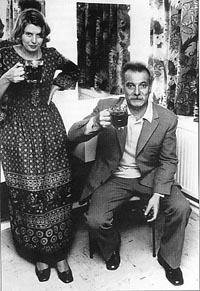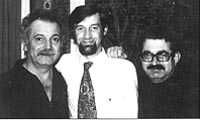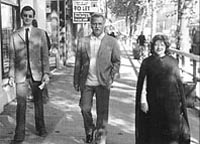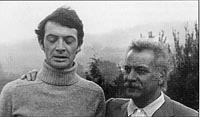|
Brassens
au Pays de Galles
in
Les Amis de Georges n°70, novembre-décembre 2002
Début
septembre 1970, tout seul à Paris, je préparais la soutenance d'une
grosse thèse. Je recevais de Cardiff, presque chaque
jour,
des feuilles tapées que je corrigeais, renvoyais... Puis,
grève
des postes - plus de feuilles, thèse en suspens. C'est à
ce
moment-là, par peur du vide,
que
j'ai songé à un projet que je
mijotais
depuis quelques années et
que la thèse avait écarté - un
livre
sur la chanson française que j'avais déjà enseignée à l'Uni-
versité
de Cardiff. Par où commencer, ou plutôt, comme tou-
jours,
comment me motiver ?
Choisissons, me suis-je dit, le plus grand et commençons par un
contact.
Avec la désinvolture et la confiance de mes trente ans, je fais
mes
recherches, trouve le numéro de Pierre Onténiente, lui explique
mon
projet au téléphone alors qu'il rentrait
justement de vacances.
Il
va en parler, dit-il, à Georges et me rappellera. Dès le lendemain,
Pierre m'annonce que Georges veut bien rencontrer le jeune professeur
anglais ; on pourra aller rue Santos-Dumont un
après-midi ; Pierre m'y conduira en voiture. La petite "Mini"
de
Georges embarque à son bord : moi, Christine - une amie qui sera
l'ingénieur
du son -, mon magnétophone, une longue liste de questions
soigneusement
préparées, et un grand chien affectueux qui a nom
Kafka.
Georges
vient à la porte nous saluer.L'effet du réel sur l'image médiatisée
peut être extraordinaire : on connaît cette voix, cette tête, et
pourtant l'homme à qui l'on serre la main n'est plus la vedette ; il
existe maintenant dans une autre dimension, comme nous existons pour lui
dans une autre dimension. On n'est plus un de ceux qui applaudissaient
et qu'il ne voyait pas parce qu'il avait
arrangé
les projecteurs justement pour éviter cela. Vous êtes deux
hommes
; il y a un abîme entre vous et il s'agit de construire un pont.
Pourquoi Georges a-t-il accepté ? Pierre m'a dit par la suite qu'il
recevait des centaines de requêtes identiques, de personnes bien plus méritantes
- me semblait-il - que moi. Je crois qu'il faut voir là la curiosité
humaine de Georges - observer un Anglais de près l'intéressait,
l'amusait, l'intriguait (c'est ce qu'il a dit plus ou moins à Louis
Nucera, voir Jacques Vassal Brassens ou la chanson d'abord,
p.303)(1). Et puis, comme toujours, le hasard : il rentrait de vacances,
il était disponible. Jamais un coup de téléphone n'abolira le hasard
; mais il peut parfois collaborer avec lui. Entre nous, ça a bien marché.
J'ai commencé
par quelques questions laborieuses mais les réponses sérieuses
et réfléchies de Georges m'intéressaient et peu à
peu
je laissai tomber mes notes et réagissai, essayant d'approfondir,
d'explorer.
Il a abordé des sujets qu'il n'avait pas, semble-t-il, évoqués
auparavant, notamment en ce qui concernait son désespoir à la Libération,
et la perte de sa foi en l'Homme.
Trois
heures plus tard nous nous séparâmes. On avait construit un
pont
ensemble avec des mots, des voix et. c'était tout de suite l'aventure !
Il fut convenu qu'il viendrait me rendre visite au Pays de Galles, avec
Pùppchen. "Pùppchen aimera ça, n'est-ce pas ?", a-t-il dit
à Pierre, surpris. Je ne me rendis pas compte à quel point il était
inouï que Georges, ce grand casanier, se lance ainsi dans
un inconnu gallois.
Un mois plus tard je les retrouvai à
l'aéroport de
Cardiff. Sur la route reliant
l'aéroport à mon domicile, il remarque
les maisons : "Bow-windows" fait-il, se souvenant soudain de
ses cours d'anglais à Sète! On joua les touristes : du magnifique château
fort normand de Caerphilly où
Georges fut surtout frappé par de petits
canards sur l'eau, aux rues de Cardiff
où Georges se promenait sans
que personne ne le remarquât - ce
qu'il n'avait pu faire depuis des années
! Il
fit connaissance avec ma femme, mon
fils, mes amis dont un grand violoniste
classique, Freddy Wang. On a
mangé, je crois, du gigot gallois et
de la cuisine chinoise.
Puis ils sont repartis. Il a écrit deux lettres
de remerciements, l'une à ma
femme,
l'autre à moi. La lettre adressée à ma femme avait la couverture
de
son premier disque d'adolescente : à seize ans, chez sa correspon-
dante
française, à Vichy elle avait découvert
Le Gorille et Hécatombe.
De
retour à son lycée gallois, son nouveau
vocabulaire avait un peu
choqué
l'admirable femme qui était son
professeur de français. Quant à
ma
lettre, elle contenait une page manuscrite,
tirée d'un cahier - un
poème
avec le refrain Mon pote le poète.
Après
ce premier séjour, Georges me
téléphonait assez
souvent et on discutait comme discutent des copains.
Il
nous envoyait des livres, sur Paris ou sur la langue.
Deux
ans plus tard, l'Université de Cardiff avait construit un nouveau
théâtre
et j'eus l'extravagante idée de demander à Georges de venir
chanter
pour l'inaugurer. Il accepta !
Cette
fois nous nous retrouvâmes à Heathrow. J'étais accompagné par
Jake
Thackray auteur-compositeur-interprète assurant la première par-
tie.
Jake est l'auteur de mer veilleuses traductions de Georges en
anglais
(notamment Brotber Gorilla). Comme il l'a dit plusieurs
fois
en public depuis, pour lui, qui adorait
Georges, cette expérience
relevait
au pinacle ! Apprenant, à sa grande surprise, que Georges Bras-
sens
venait en Angleterre, l'imprésario de Jake lui prête sa Rolls Royce
avec
chauffeur, et c'est ainsi que Georges et Pùppchen découvrirent
Londres
en Rolls, de nuit, émerveillés par tout, heureux comme des
enfants.
Nous descendons dans un vieil hôtel traditionnel de Mayfair,
Brown's,
et le soir, invités par Jake au célèbre club de Jazz Ronnie Scott's,
nous
allons applaudir la vedette de la soirée : Stéphane Grappelli. Grap-
pelli,
apprenant à l'entr'acte la présence de Georges dans la salle, croit
à
une blague, vient voir quand même, puis tombe dans les bras de
Georges,
les larmes aux yeux.
Jake
nous conduit le lendemain à Cardiff. Georges et Pùppchen dorment chez
moi. Pierre Nicolas nous rejoindra un peu plus tard. Nous préparons le
concert, choisissant un florilège de chansons (mon désir d'entendre Le
grand Pan ne fut hélas pas exaucé !). Karl Francis, cinéaste gallois
travaillant pour BBC2, me demande l'autorisation de filmer.Après une
courte hésitation, j'accepte, à condition toutefois que les caméras
restent invisibles. Le film fut
admirable.Ray
Brown, créant l'année dernière une émission de radio pour la BBC sur
la visite de Georges à Cardiff, a retrouvé ce film dans les archives.
M'interviewant
pour son émission, Ray me demande de lui dire ce que
je
ressentais au Sherman ce soir-là. Lui décrivant mon état de "
stupé-
faction,
de délire triomphal ", j'ajoutai : " J'étais ravi par tout
ce qui se
passait;
nous étions heureux ".
Il restait
une dernière entorse aux habitudes de Georges. Brassens exerça une
pression sur Philips pour que sorte le disque de l'enregistrement fait
ce soir-là. C'est grâce à cela que nous avons le seul disque live de
Brassens, qui est aussi une sorte de "Best of" :
"Brassens in Great Britain" (l'enregistrement de la première
partie - Jake Thackray - du concert n'a jamais été publié).
(1) La modestie de Colin Evans lui fait omettre de rapporter que
Brassens, d'après Vassal, aurait dit "...comme il est charmant,
comme il est gentil, j'ai marché".
|
Brassens
in Wales
Early September 1970: I was alone in Paris finishing off a thesis.
Almost every day I would get from Cardiff a parcel of typescript which I
would correct and send back to the typist. Then there was a postal
strike– no more pages, thesis in the air. That was when, from fear of
having nothing to do, I thought about a project which I had been mulling
over for years and which the thesis had put on the back burner. The idea
was a book on the French chanson which
I had already been teaching at Cardiff University.
But where to start and, as always, how to get the motivation?
Let’s start, I told myself, at the top and by a personal contact. With
the carefree confidence of the 30 year-old I looked things up, found the
phone number of Pierre Onteniente, spoke to him on the phone –the day
after he got back from holiday – and explained my project. He said he
would speak to Georges and call me back. The next day he called and said
yes, Georges would like to speak to the young English teacher; we could
go rue Santos-Dumont in the afternoon; Pierre would drive me there.
Which he did – into Georges’s Austin Mini he squeezed me, my
taperecorder, a friend Christine who would do the recording, a long list
of questions I’d prepered and a big affectionate dog called Kafka.
Georges came to the door to greet us. The effect which reality has on
the media image is astonishing: you know the voice, the face - and yet
the man whose hand you shake is no longer the star; he exists in another
dimensiuon – as we exist in another dimension for him. We are no
longer one of those who clap and cheer and whom he never sees because he
arranges the lights deliberately at eye-level to prevent him seeing.
There are two of you; there’s a gulf between you and you need to build
a bridge.
Why did Georges agree? Pierre
told me later that he got hundreds of similar requests – from people
much more deserving (it seems to me) than I was. I think it was
Georges’s human curiosity – to see an Englishman close-up interested
him, amused him (This is more or less what he told Louis Nucera, see
Jacques
Vassal Brassens ou la chanson d'abord, p.303 ). And
then – as ever – sheer luck: he had just got back from a holiday, he
was available: chance and my phone call worked together. And we hit
it off. I began by asking
my rather heavy-handed questions but Georges’s serious and throughful
answers interrested me and I began to abandon my notes and to react, to
take him further, to explore with him. He told me things which he had
not said, it seems, previously – particularly his despair at the time
of the Liberation of Paris and the loss of his faith in mankind.
Three hours later we separated. We
had built a bridge with words and voices and over it we proceeded to
skip. We agreed he and Pupchen would come to Wales to visit me.
‘Pupchen would like that wouldn’t she?’ he said to a surprised
Pierre. I didn’t realise how amazing it was that Gerges, the great
stay-at-home, should leap like this into a Welsh unknown.
A month later I met them at the airport in Cardiff.
On the way to my house he noticed the houses: ‘Bow
windows’ he murmured,
remembering suddenly his English lessons at Sète. We did tourist things
– the great Norman castle at Caerphilly where Georges was struck
mainly by a flotilla of ducks on the moat, the shopping streets of
Cardiff where Georges walked without anyone recognizing him –
something he had not done for years. He met my wife Carol and my son
Nick, my friends, including a great classical violinist, Freddy Wang. We
ate Welsh lamb I think and Chinese.
Then they left.He wrote two separate letters of thanks, one to Carol and
one to me. Hers had the cover of the first record of his she had owned;
at 16 staying in Vichy with her pen-friend she had discovered Le Gorille
and Hecatombe. Back in her Welsh Grammar School her new vocabulary had
shocked the admirable lady, Miss Rees, who taught her French.
Mine contained a manuscript page, torn from a notebook – a poem
with the refrain ‘Mon pote le poète’.
After this stay he phoned me often and we would chat. He sent us books,
about Paris or about language.
And then, two years later the University of Cardiff built a new theatre
and I had the wild idea of asking Georges Brassens to come and do a
concert to inaugurate it. He agreed.
This time we met at Heathrow. I was accompanied by Jake Thackray who was
going to sing the first half. Jake
is the author of marvellous translations of Brassens. As he said many times in public, for him it was the summit of
his career. Learning to his
great surprise that Brassens who never left France was coming to Britain,
Jake’s agent loaned him his Rolls and chauffeur, and it was in a Rolls,
at night, that Georges and Pupchen discovered London for the first time
in their lives, amazed at everything, happy as children We stayed in an
old traditional hotel in Mayfair, Browns, and in the evening, Jake
invited us to Ronnie Scott’s. The star that evening was Stéphane
Grappelli. Grappelli learned in the interval that Georges was in the
audience, and, thinking someone was pulling his leg, came out to see. He
fell into Georges’s arms, tears in his eyes. They had known hard times
together.
Jake drove us to Cardiff the next day.
Georges and Pupchen stayed with me. Pierre Nicolas, the
bass-player came later. We
prepared the concert, choosing songs which are a sort of ‘Best of
Brassens’ (something Georges never did). We had to choose the ones he
still knew by heart. The BBC learned what was happening and Karl
Francis, a Welsh film-maker working for BBC2, asked if he could film the
concert. I said no at first, then Georges said why not and I said yes
provided the cameras were discreet. Which they were and the film was
excellent. Ray Brown who
made a radio programme last year on Georges’s visit was able to find
it in the BBC archives. Interviewing
me for this programme Ray asked me what I felt at the Sherman that night
and I replied that I was ‘in a state of amazement, of triumphant
delight – delighted at everything that had happened; we were happy.’
Georges made one more exception to his rules. He convinced Philips to
issue a record of his part of the concert. That is why we we have the
only live recording of Brassens - Brassens in Great Britain 832.268
Now in a CD box set - 11, 836-2992 with a few extra songs.
Jake’s part of the concert has not been published.
(1) Being modest, Colin Evans skips Brassens' sentence, as noted by
Vassal : "...as he's a charming person, as he's nice kind, I went
for it" |
Jake
Thackray
in Les Amis de Georges
n°73, mai-juin 2003
Jake
Thackray est mort le 24 décembre 2002, à l'âge de 64 ans. J'ai
raconté
dans le numéro 70 des Amis de Georges comment en 1973 Jake a
organisé
avec moi le voyage de Georges et de Pùppchen à Londres et
à
Cardiff. Jake a chanté la première
partie du
concert de Cardiff - ses
propres
chansons et une de ses traductions de Georges - Brother Gorilla.
Il
a souvent répété par la suite, notamment au cours d'une interview
don-
née
à la BBC en 2002, que ce fut l'apogée de sa carrière.
Ses
traductions sont de loin les meilleures en langue anglaise, parce que
lui-même était un auteur-compositeur de génie. Ses chansons,
comme
celles de Georges, sont ancrées
dans un terroir à la fois réel
(le
Yorkshire) et imaginaire (folklore et
littérature). Les journaux ont parlé
de
Noël Coward; mais il fallait plutôt dire
que Jake fut le Brassens anglais -
même
humanité, même humour, même
manière de raconter, même
maîtrise
de la langue et mêmes liber tés
prises avec elle. Mais là où le
génie
de Georges œuvrait dans une longue
tradition ininterrompue, en
Angleterre
Jake travaillait toujours à contre-courant.
Sa relation
à Georges est curieuse et touchante.
Georges lui a rendu visite,
à
Monmouth, en 1973 après le concert
(le numéro 70 montrait une
photo,
prise ce jour-là, où Jake a les yeux
fermés comme s'il croyait
rêver).
Il a par la suite été plusieurs fois
rue Santos-Dumont ; Georges a
écouté
ses chansons, appréciant la
musique, ne
comprenant guère les
paroles.
Lors d'une interview en 1971 Jake
m'a dit, parlant de ses séjours
comme
professeur d'anglais, en Algérie
et plus tard à Lille, «J'étais ivre de
la
langue française et puis je suis tombé amoureux de Georges Brassens
que j'ai entendu, comme ça, à la radio». C'est là l'expérience de
beaucoup d'étrangers francophiles. Mais Jake avait sa propre ambition,
sa
propre
langue, ses propres histoires, et il ajouta : «Ça m'a rendu fou. Je
l'ai
tant
écouté. Maintenant je devrais commencer à m'écouter moi-même
davantage».
Cela explique peut-être son ambivalance à l'égard de la traduction :
je
n'en
connais que trois qu'il a enregistrées, Le Gorille, Marinette, Je
rejoin-
drai
ma belle - devenues de merveilleuses chansons... anglaises. Mais
je
suis sûr qu'il en a fait d'autres qu'il ne
chantait pas de peur de ne plus
entendre
sa propre voix, un peu comme
Virginia Woolf quand un jour
elle
lut Proust et faillit désespérer. Lui qui
traduisait si bien Georges me
déclara:
«On ne peut pas l'exporter. Je crois
qu'il est simplement là. Tout ce
qu'on
peut faire c'est de se mettre sous
le grand chêne et regarder tom-
ber
les glands. Instinctivement, quand
on aime quelqu'un on dit Je
vais
te présenter aux gens de chez
moi, je vais te
faire passer. Je pense
que
c'est une erreur. On ne peut jamais
le faire connaître comme ça».
Heureusement
Jake n'a pas été conséquent
et il ajouta : «Mais je n'ai
pas
pu m'empêcher». D'où le concert de
Cardiff et ses traductions. Mais il y
aurait
davantage à dire sur l'influence de
Georges sur les autres composi-
teurs.
La
cérémonie d'adieu eu lieu au Pays
de Galles, dans la petite église
catholique
de Monmouth à laquelle Jake était fidèle. Des amis étaient
venus
de loin (dans le temps et dans l'espace) ; certains montèrent en
chaire,
parlèrent de lui, émus, racontèrent des histoires (le prêtre en
avait
une
qui était spécialement drôle). A la fin on entendit la voix enregistrée
de
Jake qui chantait The Last Will and Testament of Jake Thackray -
pas une traduction mais certainement un hommage au Testament de Georges.
Il
demande aux copains d'appeler d'abord le prêtre et puis d'aller cher-
cher
à boire : «Dites une prière ou deux pour mon âme mais vite les gars,
vite
: que la fête commence». Chanson qui, comme celle de Georges,
paraissait
ironique, drôle, généreuse quand
l'auteur, bien vivant, la chan-
tait
en souriant sur la scène du Sherman. Elle l'était toujours d'ailleurs,
dans
cette église que son cercueil venait
de quitter (Viens pépère...'). En
l'écrivant
il y a trente ans, quand le chêne
était encore debout, Jake a
certainement
dû penser que, l'heure venue,
l'on ne manquerait certaine-
ment
pas le coup de l'enregistrement.
Mais quelle émotion aujourd'hui à entendre
cette voix, si guillerette, nous inviter à
festoyer sans lui. Dieu, que
le son du magnétophone est triste...
Et
pourtant, invités non seulement par lui
mais aussi par sa veuve Sheila
et
ses trois fils, Tom, Bill, Sam, nous nous
dirigeâmes à pied vers le pub
auquel
Jake était également fidèle.
Cheers,
Jake, adieu et merci.
|
Jake Thackray
Jake Thackray died on Christmas Eve 2002, aged 64. I described in Number
70 how, in 1973, Jake organised with me the trip which Georges Brassens
and Puppchen made to London and Cardiff. Jake sang the first half of the
Cardiff concert – his own songs and one of his translations of
Brassens Brother Gorilla. He
often said (for example in an interview given to the BBC in 2002) that
it was the high spot of his career.
His translations are easily the best in English because he
himself was a songwriter of genius. His songs, like those of Georges,
are rooted in a place which is both real (Yorkshire) and imaginary
(folklore and literature). The press invoked Noel Coward but they should
have said Jake was the English Brassens – the same humanity, the same
humour, the same way of telling a story, the same mastery of language
and the same liberties taken with words.
But while Georges’s genius operated within a long,
uninterrupted tradition, Jake, in England, worked against the grain.
His relationship to Georges is
strange and touching. Georges visited him, in Monmouth, in 1973 after
the concert (Number 70 had a photo, I took that day in which Jake has
his eyes closed as if he thought he was dreaming). Jake visited Georges
at his home in the rue Santos-Dumont in Paris, on several occasions;
Georges listened to Jake’s songs, enjoyed the music but did not
understand much of the words. In a conversation with me in 1971 Jake
described how, when he was an English teacher in Algeria and then in
Lille, he was ‘drunk on the French language’ and how he ‘fell in
love with Brassens’ when he happened to hear him on the radio.
Many francophiles will recognise this experience. But Jake had
his own ambition, his own language, his own stories and he added: ‘It
drove me crazy. I listened to him so much. Now I should start to listen
to myself more’.
That explains perhaps, his ambivalence about translating Brassens. I
only know three songs recorded by him: Le
Gorille, Marinette, Je rejoindrai ma belle – all three are
marvellous English songs. But
I’m sure that he made other translations which he did not sing from
fear of not hearing his own voice, rather like Virginia Woolfe when one
day she discovered Proust and almost despaired. Jake who translated
Brassens so well declared: ‘You
can’t export him. I think he’s just there. All you can do is stand
under the great oak tree and watch the acorns fall. Instinctively when
you love someone you say I’m going to take you home and show you to the folks; I’m going to
take you there. I think
that’s a mistake. You can’t know him like that’.
Fortunately he wasn’t consistent and he added But I couldn’t stop myself. Hence the concert at Cardiff and the
translations. But one could say a lot more about Georges’s influence
on other songwriters.
The farewell ceremony took place in Wales, in the little Catholic Church
of Monmouth to which Jake was faithful.
Friends had come from a long way off (in time and place) some of
them stood up, spoke of him movingly, told stories (the priest had a
particularly funny one). At the end we heard Jake’s recorded voice
singing Last Will and Testament
– not a translation but certainly homage to Georges’s Testament. ‘Say a prayer or two for my soul then get the booze
boys’. It’s a song, like Georges’s, which sounded ironical, funny,
generous when he sang it on the stage of the Sherman in Cardiff.
It still was in this church from which his coffin had just
departed. Writing it thirty years ago Jake must have thought that
someone would have the idea of the recording.
But it was almost unbearable to hear that cheerful, lugubrious voice
inviting us to drink without him.
And yet, invited by him but also by his widow Sheila and his three sons,
Tom, Bill, Sam, we made our way up the road to the pub to which Jake was
also faithful.
Cheers Jake. Goodbye and thank you.
|



